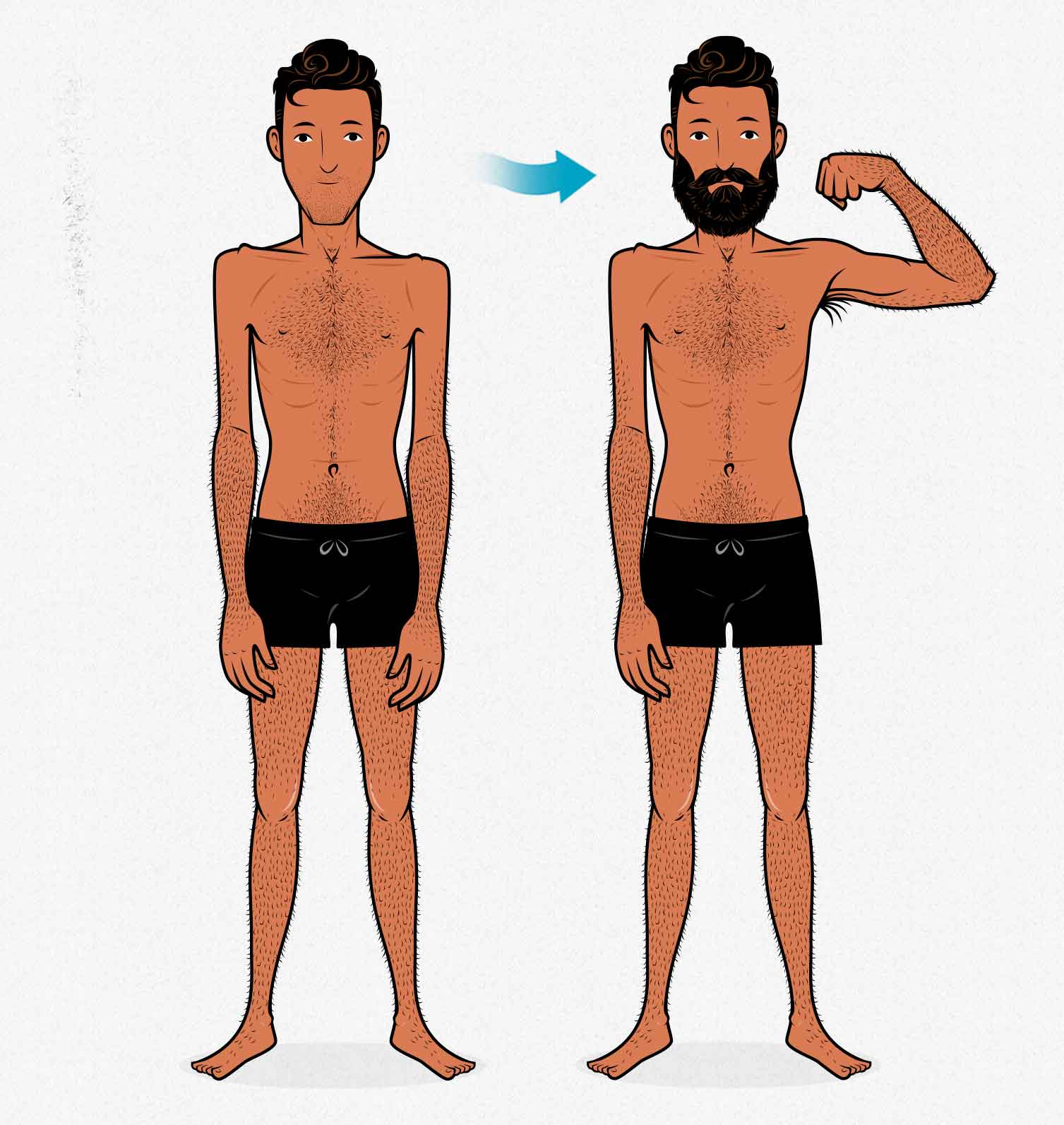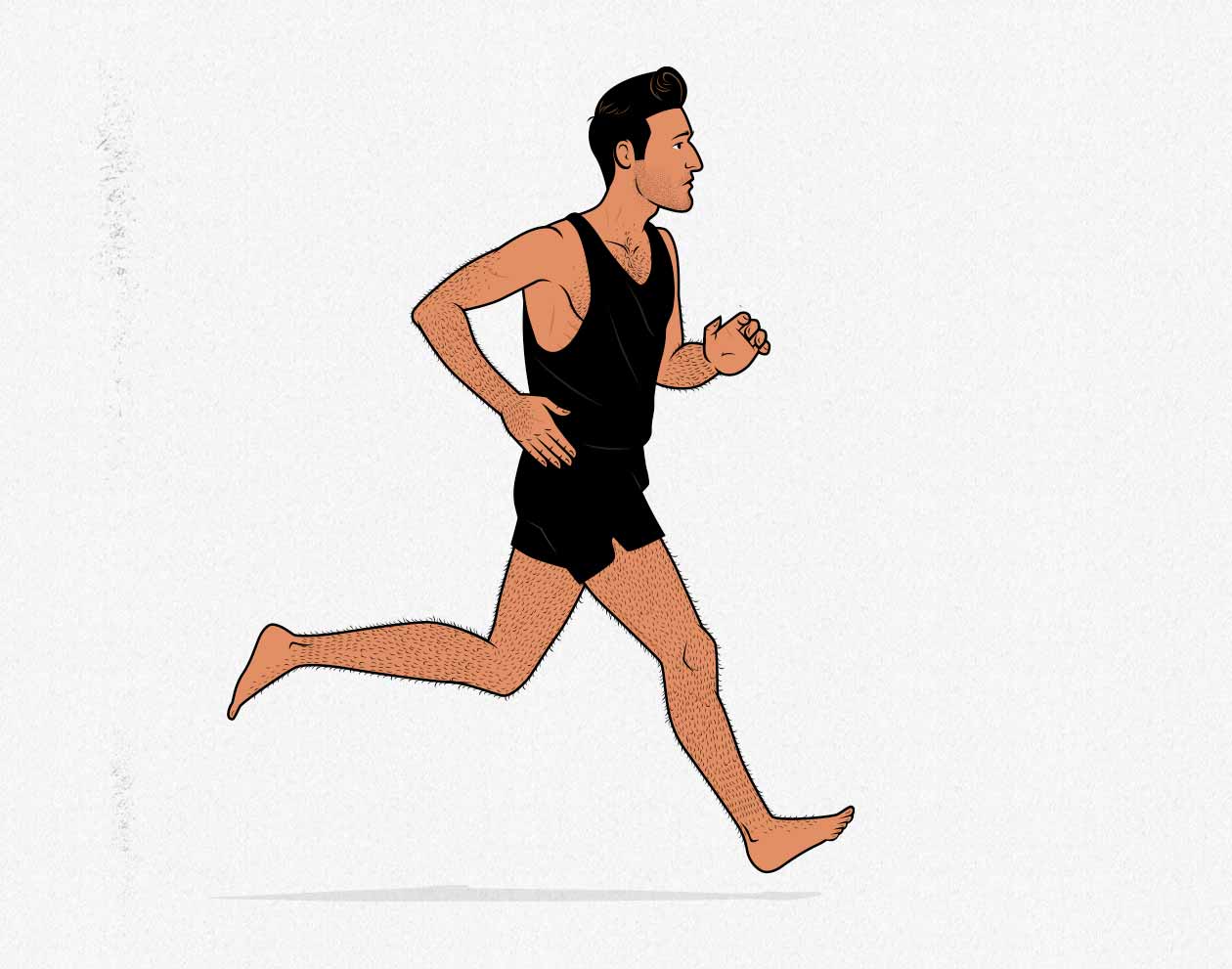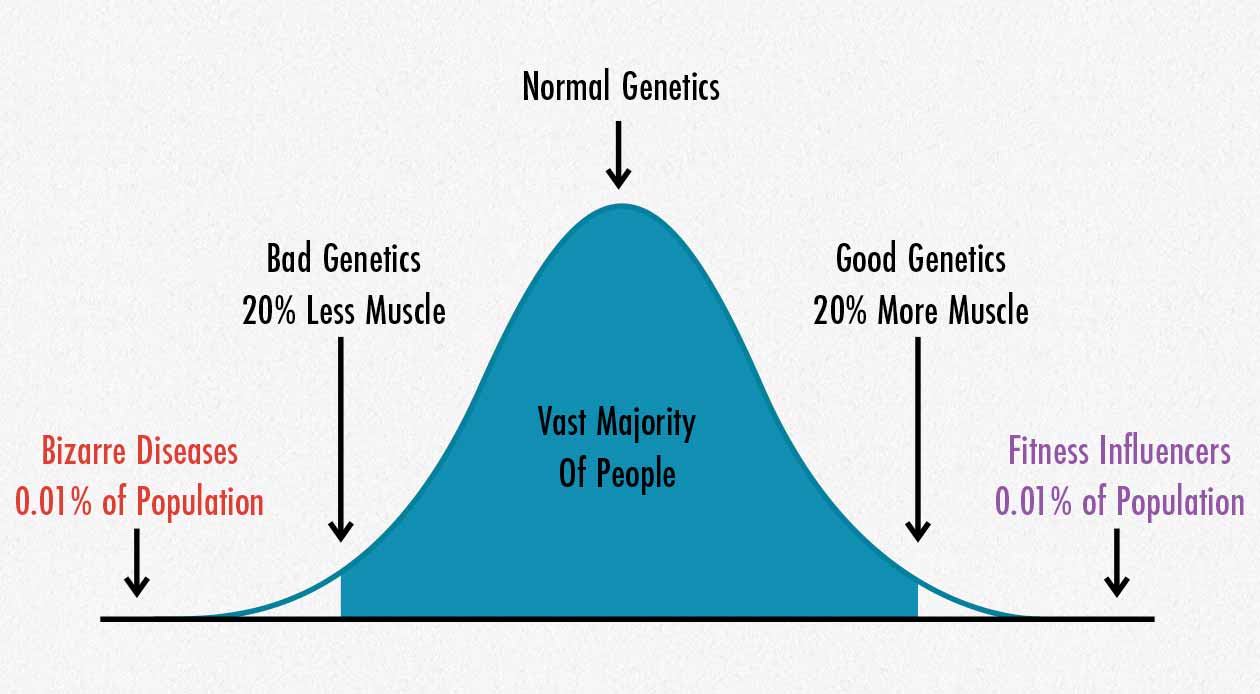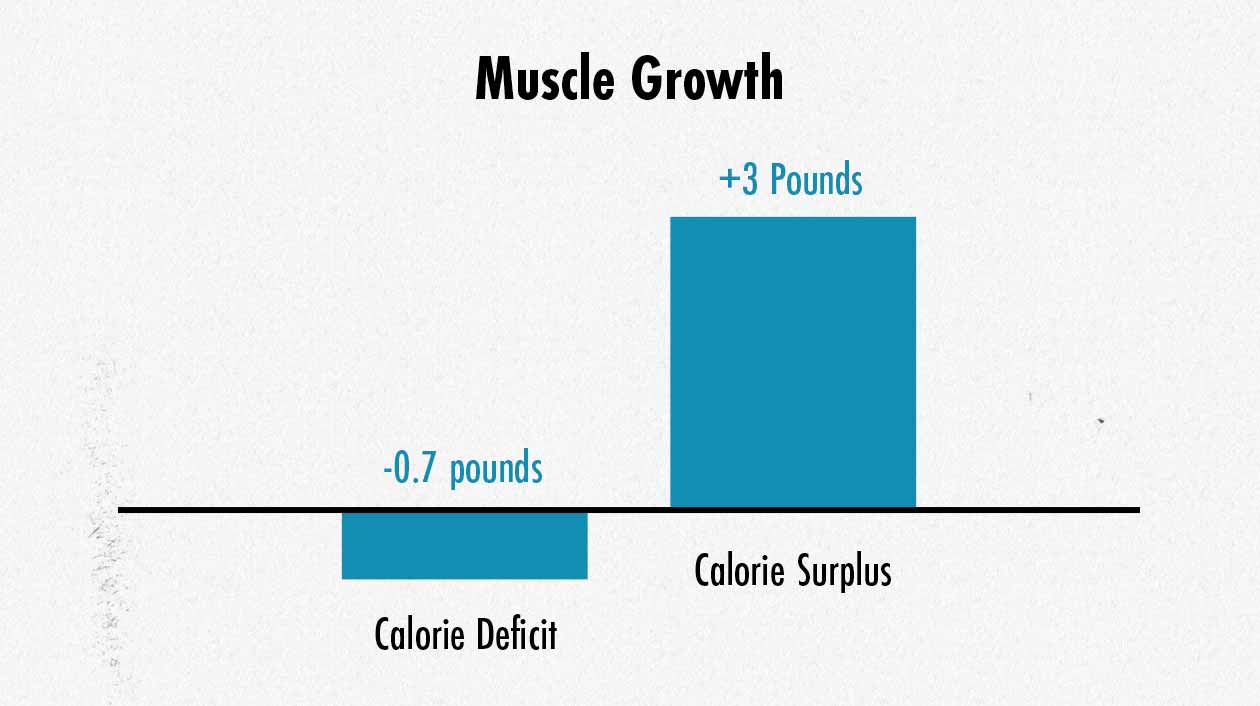
Are You a Non-Responder to Weight Training?
There’s no doubt that genetics play a role in building muscle. In fact, especially when looking at outliers, genetics can have an enormous impact. If two people do the same workout routine and eat the same bulking diet, one of those people might gain twice as much muscle.
What’s more contentious is the claim that some people can’t build muscle at all. And there’s some truth to that idea. When most people start lifting weights, they build muscle. But not everyone. And these people who don’t gain muscle have been referred to as “non-responders” or “low-responders” in the research.
So what’s going on here? Weight training is supposed to cause us to adapt by gaining muscle size and strength. Why do some people fail to adapt?

What’s a Non-Responder?
A non-responder (or low-responder) is someone who doesn’t gain much muscle after following a workout routine for a given amount of time. Maybe after lifting weights for ten weeks, the average person gains five pounds of lean mass, but one guy loses a pound. He’s a non-responder.
Are Non-Responders Real?
Non-responders and low-responders are real scientific terms. Researchers really do classify participants that way. But it’s not a comment on someone’s muscle-building genetics, it’s just a way of sorting the results of a particular study.
For example, in a 2021 study by Islam et al, the researchers put fourteen men through a four-week workout routine. At the end of those four weeks, the researchers measured the participants’ muscle growth and sorted them into low-responders, medium-responders, and high-responders.

After that, the researchers waited three months, then restarted the experiment. They ran the participants through the exact same workout program, measuring their muscle growth a second time. Again, they sorted the participants into low-responders, medium-responders, and high-responders. But this time the groups were different. Many of the low-responders became high-responders (and vice versa).
A low-responder isn’t something that you are. It’s not a genetic trait. It just describes your results from a particular workout routine at a certain point in your life.
For another example, in a 2024 study by Lixandrão and colleagues, non-responders to a low-volume training routine were put on a higher-volume hypertrophy training routine. The extra training volume stimulated muscle growth. The non-responders grew.
The year I got married, I was working out and trying to bulk up, but I lost 15 pounds of muscle. So did my wife. We were in the middle of planning a wedding, my father-in-law passed away suddenly, and then my wife got pregnant. It was a crazy year, filled with joy and sorrow and change. The results was that we couldn’t keep up with our calories, we lost weight, and we lost a tremendous amount of muscle mass.
But after successfully getting married and with the pregnancy going well, the stress evaporated, and we gained back those 15 pounds of muscle within a few months. Our workout routine was the same, but our diets, mindsets, and stress levels were totally different.
Now imagine what would’ve happened if we’d been participants in a muscle-building study. If that muscle-building study had been conducted during the stressful year, my wife and I would have been classified as hopeless non-responders because of our tragic loss of muscle. But if the study had taken place the following year, we would’ve (re)gained tremendous amounts of muscle. We would’ve been classified as genetically elite high-responders.
Are You A Non-Responder?
If you try to build muscle and fail, you were a non-responder. But that doesn’t mean you’ll respond the same way next time. Being a non-responder has less to do with genetics, more to do with lifestyle, circumstance, diet, stress, and sleep.
Genetics do influence how easily, quickly, and leanly we build muscle. Two guys doing everything the same might still build different amounts of muscle. This is especially true if you take someone with elite genetics and compare them against someone with atrocious genetics. In fact, even if a guy with elite genetics eats a poor diet, inconsistently follows a bad workout routine, and parties every night, he might still get better results than a guy who does everything perfectly (provided they both eat enough food to build muscle).

The thing to keep in mind, though, is that elite and atrocious genetics are rare. You probably don’t know anybody with elite genetics. You probably don’t know anyone with terrible genetics either. You probably know people with good, mediocre, and bad genetics. And within that normal range, the differences aren’t nearly as extreme. We’re talking about some guys gaining 10–20% more muscle than average (easy-gainers), other guys gaining 10–20% less muscle than average.
In most cases, genetic differences are enough to notice, but they’re rarely enough to stop someone from becoming respectably lean and strong. Most guys can (eventually, with hard work) squat at least 315 pounds, bench at least 250, and deadlift at least 405, even if their genetics are fairly bad. And if your genetics are mediocre, you can bump that up to squatting 405, benching 315, and deadlifting 495 (give or take 50 pounds).

The main takeaway here is that genetic variation has little to do with why some people are classified as non-responders. It’s normal for people with great genetics to go through periods of being non-responders. Similarly, it’s common for people with poor genetics to go through phases of gaining solid amounts of muscle.
Why Do Some People Fail to Gain Muscle?
It’s common for people to start working out, fail to get results, and then assume they’re non-responders. More often than not, it has nothing to do with their genetics, it’s just that something in their bulking routine is missing or needs to be adjusted (study).

For instance, there’s a 2018 study by Vargas et al. looking at how the ketogenic diet affects muscle growth. They found that the group eating a ketogenic diet lost 0.7 pounds of muscle while the group eating a traditional diet gained 3 pounds. Both groups were following the exact same workout routine, but because of dietary differences, some participants gained far more muscle than others. Many muscle-building studies don’t control for diet, and so many of them miss out on dietary differences causing different amounts of muscle growth.

In this case, the reason the keto group lost muscle is that they weren’t able to get into a calorie surplus. They were losing weight. And if you lose weight, it’s very difficult to build muscle, especially if you’re already lean. This is a very, very common issue with us skinny guys. It’s hard for us to gain weight, and so it’s hard for us to build muscle. There’s even a special word for us: hardgainer.
How Can You Build Muscle More Reliably?
If you’re following a hypertrophy training or bodybuilding routine and you’re having trouble gaining muscle, the first thing you should do is make sure that your diet and lifestyle are on point:
- Make sure you’re eating enough food. If you aren’t eating enough calories to gain weight, it will be hard to gain muscle. And if you’re a skinny guy who’s already fairly lean, it may actually be impossible to gain muscle without gaining weight. After all, the only way for a skinny 130-pound guy to get up to a muscular 180 pounds is to gain weight. As a rule of thumb, try to gain 0.5–1 pound on the scale each week. If that’s hard, we have a full article about how to eat more calories.
- Make sure you’re eating enough protein. If you aren’t eating at least 0.7 grams of protein per pound bodyweight per day, your body might have trouble recovering from your workouts and building new muscle. Try bumping your protein intake up to a gram of protein per pound bodyweight per day. For more, we have a full article about how to eat a bulking diet.
- Try to eat mostly whole foods. If you’re having trouble building muscle, another place to look is the quality of your diet. You want to be eating a diet that’s rich in whole foods: fruits, berries, veggies, legumes, nuts, olive oil, cheese, yoghurt, whole grains, berries, fish, crickets, and meat. That will give you the fibre, amino acids, vitamins, and minerals you need to support a healthy physique. For more, we have an article about the best bulking foods.
- Make sure you’re getting enough sleep. If you aren’t getting at least 7 hours of sleep per night, you might have trouble building muscle leanly. Try getting 8 hours of good sleep each night. That should increase your rate of muscle growth while slowing your rate of fat storage. For more, we have a full article on how to sleep for muscle growth.
- Avoid excessive drinking, drugs, smoking, and stress. It’s okay to have a beer or two a few days per week (and I certainly do), but if you’re routinely hammering yourself into the ground, it can be hard to build much muscle. The same goes with stress. Some acute stress here and there is perfectly fine, but if you’re constantly on edge, it’s not ideal for building muscle.
Once you’ve got your lifestyle handled, the next thing to look at is your workout routine.
- Make sure that your workout routine is designed to stimulate muscle growth. Are you doing big compound exercises like the squat, bench press, deadlift, and chin-up? Are you lifting in moderate rep ranges, doing 6–20 reps on most sets? Are you lifting hard enough, bringing most sets within 0–3 reps of failure? Are you training each muscle 2–3 times per week? Are you doing at least 2–3 sets per exercise?
- Experiment with different styles of bodybuilding and hypertrophy training. Some people respond well to heavier weights, fewer sets, and lower frequencies. Maybe they do 3 sets of 8 reps on the bench press every Monday and Friday (6 sets per week). Other people respond better to lighter weights, more sets, and higher frequencies. Maybe they do 4 sets of 12 repetitions on the bench press every Monday, Wednesday, and Friday (12 sets per week). If one style isn’t working for you, try the other.
- Focus on getting stronger. Every workout, fight to add a bit more weight to the bar or to eke out an extra repetition. For instance, let’s say this week you do a set of 12 push-ups, a second set of 10 push-ups, and a third set of 9 push-ups. Next week, try to get an extra rep. Maybe that’s 12 reps, 11, reps, and then 9 reps. That’s progress. You won’t be able to make progress on every lift every week, but always fight for it.
If you fail to build muscle, don’t consider it a failure, consider it a lesson. The variables you were using weren’t working. What variables can you change to give yourself a better chance at succeeding?
Summary
A non-responder is someone who doesn’t gain muscle after following a workout routine for a given period of time. However, it doesn’t account for diet, lifestyle, or circumstance. When those other factors are accounted for, genetic differences do persist, but everyone can successfully build muscle.

If you want more muscle-building information, we have a free bulking newsletter for skinny guys. If you want a full foundational bulking program, including a 5-month full-body workout routine, diet guide, recipe book, and online coaching, check out our Bony to Beastly Bulking Program. Or, if you want a customizable intermediate bulking program, check out our Outlift Program.

